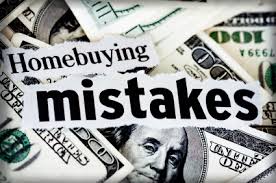Five Mistakes Made By First-Time Homebuyers
#1. It’s not all about the mortgage payments…
Most first-time homebuyers decide to get a home when they feel they can afford to pay for a mortgage.
However, Rafael Castellanos, a managing director at Expert Title Insurance stated that the fact that one is ready to pay for a mortgage does not mean one can afford to own a home.
“They have an idea of what their mortgage payment is going to be, but they don’t realize there’s much more to it,” he says.
Extra expenses
There are several costs that many first-time homebuyers are prone to lose sight of such as property insurance, maintenance, electric and water bills and taxes.
“Keep in mind property taxes and insurance have a tendency of going up every year,” Castellanos says. “Even if you can afford it now, ask yourself if you’ll be able to afford the increased costs later.”
“Even though it’s your 1st home, you must think of it as a long-term commitment,” says Ed Conarchy, a mortgage planner and investment adviser at Cherry Creek Mortgage in Illinois.
“If you have to switch jobs in a year or two and may have to move for the job, you should think twice,” says Conarchy. “Ideally, you should picture yourself living in that house for 5 to 7 years.”
#2. Putting getting a loan on the backburner
The first step in acquiring a home does not have to do with home searching. Unless you’re lucky to pay for your first home without any hassles, mortgage prequalification is necessary.
It is common for first-time homebuyers to be “afraid to get qualified” said Steve Anderson, broker, and owner of Re/Max Benchmark Realty in Las Vegas.
They tend to have this fear that the lender may sell them short by telling them that they do not qualify for a mortgage or that they only deserve one less than they ask for. “So they pick a price range out of the sky and say, ‘Let’s go look for a house,” Anderson added.
To kick things off…
That’s not the best way to go about doing things. Of course it’s more fun to go shopping or seeing houses than to sit in a lender’s office and to reveal your financial predicament; however, it must be done.
‘But that’s a backward approach’ Conarchy says.
“You get preapproved, and then you find a home,” he says. “That way you’ll make a financial decision versus an emotional decision.”
Bankrate.com serves as a good site to get access to mortgage lenders.
#3. Failing to get professional help
If you’re new to the homebuying game, you’ll surely need a reputable real estate agent, a good loan broker and probably add a lawyer on to that list.
Entering the homebuying market and embarking on the process alone without any professional assistance is not the best idea, according to Anderson. Despite the fact that every rule has exceptions, first-time homebuyers should avoid dealing with the listing agent directly, he reiterated.
“If you are getting divorced, are you going to go to your husband’s attorney for help? Of course not,” he says. “Same here. If you go to a listing agent, they are only going to show you their listings. You must find a buyers’ agent to help you.”
Find references
Hiring an agent without any references from friends or family, or whoever that may know the person is a bad idea. Ask the agent to provide references from previous buyers. The same should be applied to loan officers or mortgage brokers.
“It’s very hard for 1st-time homebuyers because they don’t know who they are dealing with,” Anderson says.
A professional that will give “truly independent advice” is vital, Conarchy says.
It may mean hiring a lawyer, Castellanos included.
“You are about to make what is possibly the largest single investment of your lifetime,” Castellanos says. “You want to make sure it’s done right.”
#4. Spending all your savings on down payments
Using up all the savings on down payments and trying to close or get rid of costs is the worst thing that newbie homebuyers make.
“Some people scrape all their money together to make the 20% down payment so they don’t have to pay for mortgage insurance, but they are picking the wrong poison because they are left with no savings at all,” Conarchy says.
Reducing savings- Utterly risky
Once a homebuyer has put 20% down, there will be no need for them to pay for mortgage insurance when acquiring a conventional mortgage. It is usually perceived as substantial savings on the monthly mortgage payment.
Conarchy was of the opinion that such is not worth the risk of living on the brink.
“I’d take paying for mortgage insurance any day over not having money for rainy days,” he says. “Everyone — especially homeowners — needs to have a rainy-day fund.”
#5. Taking up new loans before closing deals
You have succeeded in qualifying for a loan. You found your perfect house and the contract has been signed. The closing is in 30 days. This is not enough cause for you to blow more money away on a huge purchase.
Keeping your wallet on a leash
Lenders tend to examine credit reports before closing to ensure that the borrower’s financial situation has not altered since the loan was granted. Any new loans you take out on your credit report may ruin the closing.
Buyers, most especially newbies to the market, tend to learn this lesson the hard way.
“They sign the contract and they want to go buy new furniture for the house or a new car,” Anderson says. “I remember one case where just before closing, the buyer drove to the office and said, ‘Look at my brand-new car.’ I told them, ‘You’d better go back to that dealership.'”
Luckily, the dealership agreed to wait a couple of days to report the loan to the credit bureaus, he says. Otherwise, it could have killed the deal.





